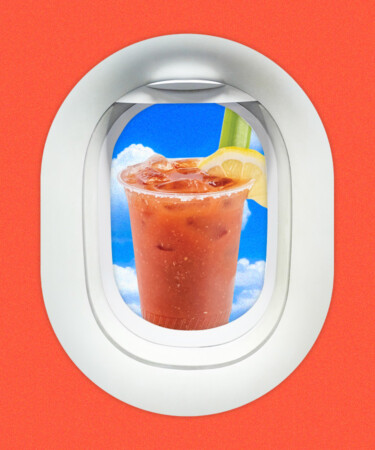There are precious few things in life more stressful than air travel, especially in recent months as the number of flight delays and cancellations continues to skyrocket. Once getting through check-in and security, many travelers brave airport pricing, grabbing a beverage to help them wind down and relax during the journey ahead.
You may have heard that, with the help of a drink or two, you’ll be able to sleep for the duration of the flight, thus beating any potential jet lag. But the truth of the matter is that drinking while flying won’t help you beat jet lag; in fact, it’s probably going to make things worse.
It’s a common misconception that jet lag is caused by a lack of sleep, hence why many people believe sleeping the entirety of a flight will leave them feeling refreshed and well rested upon arrival in a new time zone. In reality, jet lag is caused by a misalignment of the circadian rhythm, a natural process that, among other functions, lets the body know when it’s time to rest. According to Natalie Dautovich of the National Sleep Foundation, “your body clock is accustomed to the natural light/dark cycle of your home time zone.” Traveling far distances can cause this clock to become misaligned with the light/dark cycle of your destination, triggering what’s known as jet lag disorder.
If you opt for an alcohol beverage before or while flying, jet lag will not be the only variable impacting your natural circadian rhythm. According to Psychology Today, alcohol has a direct effect on circadian rhythms by diminishing the body’s natural ability to respond to light cues, preventing the rhythm from functioning properly. While it is true that a drink or two may help travelers fall asleep on the plane, alcohol disrupts the body’s ability to get proper sleep by suppressing the REM cycle — the type of sleep that allows the body to feel truly rested — meaning you could arrive at your destination feeling more tired than you did when you fell asleep.
In addition to impacting jet lag and sleep, drinking while flying has been linked to a whole host of other issues. Airplanes are required to adhere to highly regulated conditions regarding air pressure and humidity within the cabin in order for the plane to remain in flight. As such, the cabin’s air pressure is relatively low which, when paired with extreme elevations, reduces the amount of oxygen that makes its way to your brain. This has been known to cause feelings of dizziness or lightheadedness among fliers. Furthermore, humidity levels on planes are much lower than in our homes, which can dry out parts of the body like the eyes, nose, and mouth.
When alcohol is added to the mix, the altitude and air pressure can accelerate nausea or further dry out moisture-rich parts of our body, causing travelers who opt for a drink while on route to arrive at their destinations feeling less than chipper.
To really beat jet lag, make sure to stay extremely hydrated; high elevations can dehydrate you, even if you’re not drinking. Furthermore, Dautovich suggests travelers flying eastward “seek out bright light in the early morning hours and avoid bright light at night.” For westward flights, she suggests the exact opposite — seeking brighter light during the evening and avoiding it in the morning hours. This type of light exposure helps your body adapt to the natural light patterns of its new environment, thus realigning the circadian rhythm and easing jet lag.
All in all, while an adult beverage may help you relax in preparation for your time above the clouds, it can leave you feeling worse when your feet touch back down on solid land. So the next time you fly, consider waiting until touchdown to pop open your favorite bottle.
